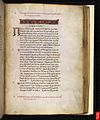Epistle to Titus facts for kids
The Epistle to Titus is a book in the Christian Bible. It is the seventeenth book in the New Testament. Many people believe it is a letter written by Paul to a church leader named Titus.
Titus was a pastor (church leader). This letter explains what church leaders should be like and what their jobs are. These leaders are sometimes called elders or bishops. This letter is one of three "Pastoral Epistles." They are called this because they were sent to pastors and are mostly about pastors.
Contents
Who Was Titus?
Titus is mentioned in the Epistle to the Galatians. In that book, Paul wrote about going to Jerusalem with Barnabas and Titus. Later, Titus was sent to Corinth, Greece. There, he helped the Christians follow Paul's teachings.
Paul then left Titus on the island of Crete. Titus's job was to help organize the Church there. After that, Titus met Paul again in Nicopolis. He later traveled to Dalmatia, which is now Croatia. Titus then became the first bishop of Crete.
What Does the Letter Say?
Warning About False Teachers
In Chapter 1, Paul talks about some people who are teaching wrong ideas. These were Jewish Christians who were spreading false information. Paul says these teachers are rebellious and talk a lot without understanding. They make other Christians believe things that are not true.
Paul explains that their empty talk does not help people. It does not help them show piety (being truly religious) or respect for God.
How Different Groups Should Act
In Chapter 2, Paul gives advice on how different people in the church should behave. He talks about:
- Older men
- Older women
- Younger women
- Young men
- Slaves
Each group is told how to live in a proper way. Everyone is told to live for God. They should do this while they wait for Jesus to return. Jesus died to free people from evil ways. He wants to make them into good people.
More About Right Living
Chapter 3 tells Christians to obey government leaders. It also tells them to live a good life and be gentle. The letter adds that Jesus saved people not because of good things they had done. Instead, he saved them through his grace and mercy. Now, Jesus wants to make them into people who always do good things.
The letter ends with a final warning. It warns against those who cause fights. It also includes some personal greetings.
The Epimenides Paradox
In the Epistle to Titus, Chapter 1, verses 12 and 13 say: "One of the Cretans, a prophet of their own, said, 'Cretans are always liars.'"
This statement is a logical paradox. A paradox is a statement that seems to go against itself. If a person from Crete says that all Cretans are liars, then we cannot know if what he says is true. This is because he would also have to be a liar.
Students who study logic often think about this problem. They try to find an answer to it. The person who first said this was named Epimenides. So, the paradox is named after him.
Images for kids
See also
 In Spanish: Epístola a Tito para niños
In Spanish: Epístola a Tito para niños
 | Bayard Rustin |
 | Jeannette Carter |
 | Jeremiah A. Brown |


